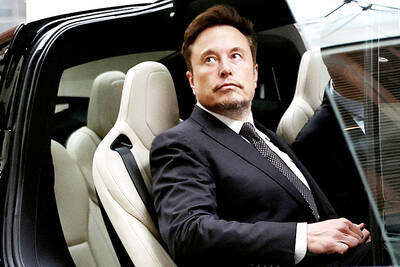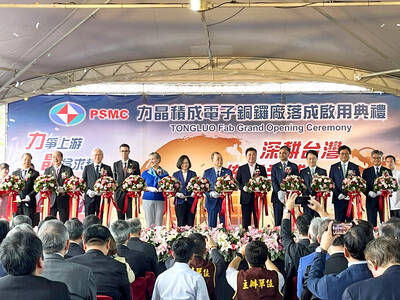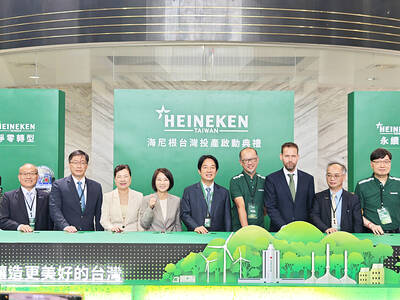HONG KONG
GDP turns corner, up 7.8%
The economy finally turned the corner after posting its fastest growth since 2010 yesterday, as the territory makes a stronger recovery from the COVID-19 pandemic and social unrest before that. After declining for a record six quarters, GDP surged 7.8 percent in the first quarter from a year earlier, data showed, beating all estimates in a Bloomberg survey of economists. While that is partly distorted by the low base a year ago when the economy was in lockdown, the quarter-on-quarter expansion, a better reflection of growth momentum, also outperformed, reaching 5.3 percent, well above an estimate of 0.7 percent. Financial Secretary Paul Chan (陳茂波) said that the economy would expand 3.5 percent to 5.5 percent this year.
HEALTH
Siemens raises outlook
Siemens Healthineers AG yesterday raised its full-year guidance amid strong sales of COVID-19 testing equipment and rebounding demand for hospital treatment. The company said it expects 2021 revenue growth of 14 percent to 17 percent, up from a previous projection for an 8 percent to 12 percent increase. The company also lifted its adjusted earnings per share outlook to 1.90 euros to 2.05 euros, compared with 1.63 euros to 1.82 euros. The company’s stock has gained 13 percent since the start of the year.
SOUTH KOREA
Short selling returns
Short selling resumed yesterday on 351 stocks on the KOSPI 200 and KOSDAQ 150. That came after a 13-month ban that was imposed during the market crash in March last year. Investors rushed to sell shares of some Korean biopharmaceutical companies which surged 67 percent last year. The healthcare sector slumped 4.9 percent, the biggest loser among KOSPI 200’s sub-gauges. Foreign investors shorted 738 billion won (US$658 million) worth of KOSPI stocks during regular trading hours yesterday, while local institutional investors shorted 63 billion won of shares, according to Korea Exchange.
HONG KONG
Forty stocks still suspended
More than 40 stocks worth a combined HK$140.9 billion (US$18.14 billion) remain suspended from trading after failing to release their earnings for last year, the highest number of such halts in at least five years. The group is part of 51 companies that missed an initial reporting deadline for preliminary results by the end of March and were forced to suspend trading on April 1. Ten companies have since reported earnings and have resumed trading, including Hainan Meilan International Airport Co (海南美蘭國際機場), an airport operator in China’s southern province of Hainan.
INDIA
IPOs surge despite virus
A sharp surge in COVID-19 cases would not prevent the country’s markets from setting a record for initial public offerings (IPOs) this year, as a cohort of technology companies make their much-anticipated debuts later in the year, according to UBS Group AG. Last year companies amassed US$4.6 billion from IPOs, according to data compiled by Bloomberg, and Anuj Kapoor, head of investment banking at UBS India, said that the figure would be easily eclipsed. “I would say we will surpass twice the money we raised in 2020 through IPOs,” Kapoor said. So far this year, IPOs have raised nearly US$3 billion, the best start to the year since 2018, the data show.

purpose: Tesla’s CEO sought to meet senior Chinese officials to discuss the rollout of its ‘full self-driving’ software in China and approval to transfer data they had collected Tesla Inc CEO Elon Musk arrived in Beijing yesterday on an unannounced visit, where he is expected to meet senior officials to discuss the rollout of "full self-driving" (FSD) software and permission to transfer data overseas, according to a person with knowledge of the matter. Chinese state media reported that he met Premier Li Qiang (李強) in Beijing, during which Li told Musk that Tesla's development in China could be regarded as a successful example of US-China economic and trade cooperation. Musk confirmed his meeting with the premier yesterday with a post on social media platform X. "Honored to meet with Premier Li

ARTIFICIAL INTELLIGENCE: The chipmaker last month raised its capital spending by 28 percent for this year to NT$32 billion from a previous estimate of NT$25 billion Contract chipmaker Powerchip Semiconductor Manufacturing Corp (力積電子) yesterday launched a new 12-inch fab, tapping into advanced chip-on-wafer-on-substrate (CoWoS) packaging technology to support rising demand for artificial intelligence (AI) devices. Powerchip is to offer interposers, one of three parts in CoWoS packaging technology, with shipments scheduled for the second half of this year, Powerchip chairman Frank Huang (黃崇仁) told reporters on the sidelines of a fab inauguration ceremony in the Tongluo Science Park (銅鑼科學園區) in Miaoli County yesterday. “We are working with customers to supply CoWoS-related business, utilizing part of this new fab’s capacity,” Huang said, adding that Powerchip intended to bridge

Dutch brewing company Heineken NV on Friday announced an investment of NT$13.5 billion (US$414.62 million) over the next five years in Taiwan. The first multinational brewing company to operate in Taiwan, Heineken made the statement at a ceremony held at its brewery in Pingtung County. It also outlined its efforts to make the brewery “net zero” by 2030. Heineken has been in the Taiwanese market for 20 years, Heineken Taiwan managing director Jeff Wu (吳建甫) said. With strong support from local consumers, the Dutch brewery decided to transition from sales to manufacturing in the country, Wu said. Heineken assumed majority ownership and management rights

Microsoft Corp yesterday said that it would create Thailand’s first data center region to boost cloud and artificial intelligence (AI) infrastructure, promising AI training to more than 100,000 people to develop tech. Bangkok is a key economic player in Southeast Asia, but it has lagged behind Indonesia and Singapore when it comes to the tech industry. Thailand has an “incredible opportunity to build a digital-first, AI-powered future,” Microsoft chairman and chief executive officer Satya Nadella said at an event in Bangkok. Data center regions are physical locations that store computing infrastructure, allowing secure and reliable access to cloud platforms. The global embrace of AI